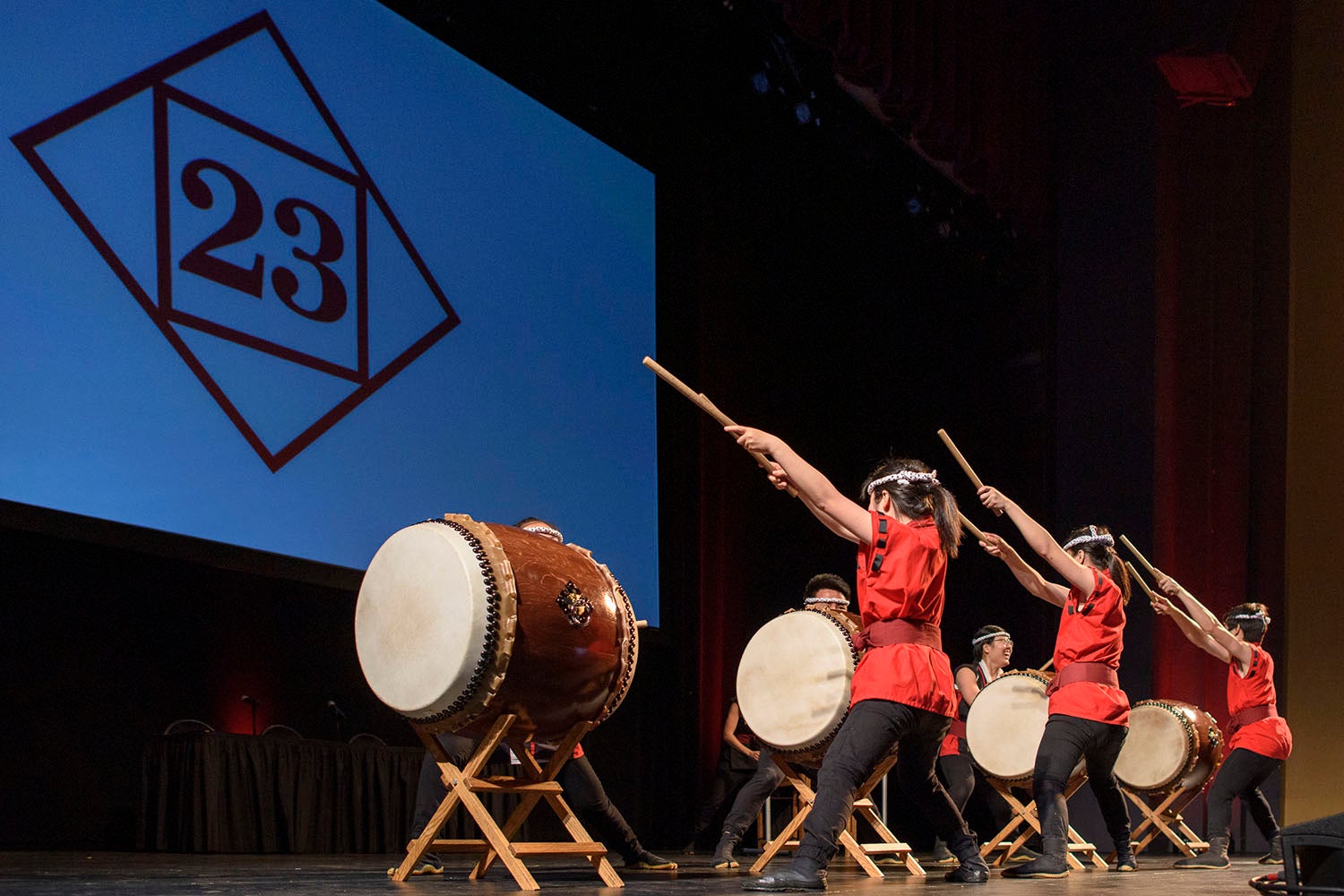Events and exhibits across campus in May are helping to honor the contributions of Asians, Asian Americans, and Pacific Islanders at Stanford.

Stanford Taiko, shown here performing at Admit Weekend for the Class of 2023, will perform a concert of original works with special guest San Jose Taiko at Bing Concert Hall on May 6. (Image credit: L.A. Cicero)
“Asian American and Pacific Islander Heritage Month is an opportunity for us to honor the history and contributions of these diverse communities,” said Stanford President Marc Tessier-Lavigne. “This month, I encourage everyone in our university community to participate in the planned events and exhibits, and to draw inspiration from the stories and accomplishments of the Asian, Asian American, and Pacific Islanders who live, work, and learn at Stanford.”
Stanford’s Asian American Activities Center, also known as A³C, has organized a number of Asian Pacific American Heritage Month events. Many other groups across campus are hosting AAPI-related events.
Lectures and talks
May 2
Artisanal Heart: The Vernacular Engineers of Early Modern Korea
Join scholar Hyeok Hweon Kang as he traces how artisans of Choson Korea developed a proficient, multimedia system of material design and production.
The U.S.-China Rivalry and Japan’s Position
Professor Ryosei Kokubun, the Payne Distinguished Fellow at FSI for the 2023 spring quarter, will examine Japan’s role in the ongoing U.S.-China strategic competition and its potential impact on Asia-Pacific regional security.
Hepatitis B in Asian Americans-What You Can Do to Lower Your Risk
Samuel So, MD, will talk about hepatitis B, how it is transmitted, prevention, screening, and treatment.
Korea Entrepreneur Panel on Newest Trends
This program is part of an eight-week series on “Entrepreneurship in Asian High-Tech Industries,” which continues weekly until May 30, 2023.
May 4
A Conversation on Island Cultures and Environmental Leadership
Join Peter Vitousek and Kamana Beamer, longtime collaborators on the First Nations Futures Program, for a conversation on the intersections of indigenous leadership, island cultures, and the environment.
May 9
Tech Startups and VC: How Cross-Pacific Collaboration Works IRL
Leaders from Philippine’s Kickstart Ventures join a few of their U.S.-based portfolio companies to discuss patterns of international relationships between Asia and the U.S.
May 11
Auntologies: Queer Aesthetics and South Asian Aunties
This talk examines how the aunty’s aesthetic practices open up queer possibilities, instead of foreclosing them.
The Other Great Game: The Opening of Korea and the Birth of Modern East Asia
This talk will illuminate Korea’s role in the “other” Great Game in East Asia over control of the Korean peninsula.
May 15
Topophilia and the Twenty Poems About Dunhuang: Locus et amor loci
Charles Sanft will introduce the Twenty Poems and consider them in terms of what W.H. Auden called topophilia, the love of place.
Accidental Holy Land: Biography of a Book
This talk is based on a recently published book on the northern Shaanxi revolution, the product of 30 years of research and numerous fieldwork trips to the region.
May 17
The Allure of Empire traces how American ideas about race in the Pacific were made and remade on the imperial stage before World War II.
A Philosophy of Hedonism in Early China: Understanding Yang Zhu in Ancient and Medieval Texts
An intellectual and cultural historian of early China will outline the ways in which “hedonism” as a term can aptly describe doctrines from ancient China.
May 25
Tools of the Trade: Shifting U.S. and Chinese Approaches to Trade Arrangements
Stanford’s China program hosts a conversation on trade agreements in the Asia-Pacfic region.
Bishop Marvin Harada: “The Past, Present, and Future of the Buddhist Churches of America”
This discussion will focus on the challenges of turning around a declining and aging membership.
The arts

Cantor Arts Center conservator Catherine Coueignoux prepares a mask for display in The Faces of Ruth Asawa, an ongoing installation at the Cantor featuring the work of the Japanese American artist. (Image credit: Andrew Brodhead)
Stanford Taiko with special guest San Jose Taiko: Impulse is May 6.
Xiaoze Xie: Flammable Ideas, Fragile Objects
This exhibition of work by Professor Xiaoze Xie is on display at the East Asia Library through the end of spring quarter.
This video installation by the Korean American artist A young Yu is at the Cantor through May 7.
The Faces of Ruth Asawa is a long-term installation at the Cantor.
Artist Jean Shin in conversation with Art Historian Marci Kwon
The Burt and Deedee McMurtry Lecture presented by the Anderson Collection is May 10.
Community and shared cultural opportunities for students
A special dinner menu in all Residential & Dining Enterprises dining halls on May 11 will celebrate regional Asian cuisines. Through a month-long collaboration between R&DE Stanford Dining, Hospitality & Auxiliaries, the School of Medicine’s CARE Team, and the NOURISH Project, Tasting Tables will feature dishes from China, Japan, Vietnam, the Philippines, India, and Korea on Wednesdays: May 10 in AFDC, May 17 in Wilbur, May 24 in Lakeside, and May 31 in FloMo. Details on these and related celebrations will be available soon from R&DE.
Throughout the year, students can find community through the A³C, which brings together Asian and Asian American students, faculty, staff, and alumni to promote understanding and awareness of the Asian experience in America. Upwards of 30 student organizations hold weekly meetings and rehearsals at A³C, and use the office as workspace for event planning.
In addition, the university’s Native American Cultural Center serves as a resource for Indigenous Pacific Islander students and groups. Opportunities include Hui o Nā Moku, a student organization dedicated to celebrating and sharing Polynesian cultures; Kaorihiva, the university’s Polynesian dance group; and the Marianas Club, a group of undergraduate and graduate students who are dedicated to perpetuating the culture of the Mariana Islands.